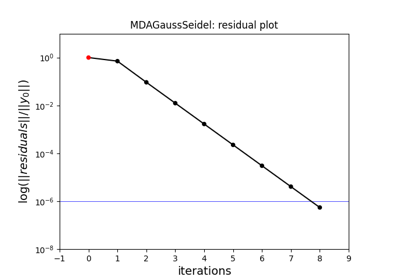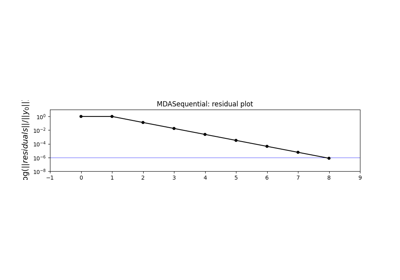gauss_seidel module¶
A Gauss Seidel algorithm for solving MDAs.
- class gemseo.mda.gauss_seidel.MDAGaussSeidel(disciplines, name=None, max_mda_iter=10, grammar_type=GrammarType.JSON, tolerance=1e-06, linear_solver_tolerance=1e-12, warm_start=False, use_lu_fact=False, over_relax_factor=None, coupling_structure=None, log_convergence=False, linear_solver='DEFAULT', linear_solver_options=None, acceleration_method=AccelerationMethod.NONE, over_relaxation_factor=1.0)[source]
Bases:
BaseMDASolverPerform an MDA using the Gauss-Seidel algorithm.
This algorithm is a fixed point iteration method to solve systems of non-linear equations of the form,
\[\begin{split}\left\{ \begin{matrix} F_1(x_1, x_2, \dots, x_n) = 0 \\ F_2(x_1, x_2, \dots, x_n) = 0 \\ \vdots \\ F_n(x_1, x_2, \dots, x_n) = 0 \end{matrix} \right.\end{split}\]Beginning with \(x_1^{(0)}, \dots, x_n^{(0)}\), the iterates are obtained by performing sequentially the following \(n\) steps.
Step 1: knowing \(x_2^{(i)}, \dots, x_n^{(i)}\), compute \(x_1^{(i+1)}\) by solving,
\[r_1\left( x_1^{(i+1)} \right) = F_1(x_1^{(i+1)}, x_2^{(i)}, \dots, x_n^{(i)}) = 0.\]Step \(k \leq n\): knowing \(x_1^{(i+1)}, \dots, x_{k-1}^{(i+1)}\) on one hand, and \(x_{k+1}^{(i)}, \dots, x_n^{(i)}\) on the other hand, compute \(x_1^{(i+1)}\) by solving,
\[r_k\left( x_k^{(i+1)} \right) = F_1(x_1^{(i+1)}, \dots, x_{k-1}^{(i+1)}, x_k^{(i+1)}, x_{k+1}^{(i)}, \dots, x_n^{(i)}) = 0.\]These \(n\) steps account for one iteration of the Gauss-Seidel method.
Initialize self. See help(type(self)) for accurate signature.
- Parameters:
disciplines (Sequence[MDODiscipline]) – The disciplines from which to compute the MDA.
name (str | None) – The name to be given to the MDA. If
None, use the name of the class.max_mda_iter (int) –
The maximum iterations number for the MDA algorithm.
By default it is set to 10.
grammar_type (MDODiscipline.GrammarType) –
The type of the input and output grammars.
By default it is set to “JSONGrammar”.
tolerance (float) –
The tolerance of the iterative direct coupling solver; the norm of the current residuals divided by initial residuals norm shall be lower than the tolerance to stop iterating.
By default it is set to 1e-06.
linear_solver_tolerance (float) –
The tolerance of the linear solver in the adjoint equation.
By default it is set to 1e-12.
warm_start (bool) –
Whether the second iteration and ongoing start from the previous coupling solution.
By default it is set to False.
use_lu_fact (bool) –
Whether to store a LU factorization of the matrix when using adjoint/forward differentiation. to solve faster multiple RHS problem.
By default it is set to False.
over_relax_factor (float | None) – Deprecated, please consider using
MDA.over_relaxation_factorinstead. The relaxation coefficient, used to make the method more robust, if0<over_relax_factor<1or faster if1<over_relax_factor<=2. Ifover_relax_factor =1., it is deactivated.coupling_structure (MDOCouplingStructure | None) – The coupling structure to be used by the MDA. If
None, it is created from disciplines.log_convergence (bool) –
Whether to log the MDA convergence, expressed in terms of normed residuals.
By default it is set to False.
linear_solver (str) –
The name of the linear solver.
By default it is set to “DEFAULT”.
linear_solver_options (Mapping[str, Any] | None) – The options passed to the linear solver factory.
acceleration_method (AccelerationMethod) –
The acceleration method to be used to improve the convergence rate of the fixed point iteration method.
By default it is set to “NoTransformation”.
over_relaxation_factor (float) –
The over-relaxation factor.
By default it is set to 1.0.
- execute_all_disciplines()[source]
Execute all the disciplines in sequence.
- Return type:
None
- assembly: JacobianAssembly
- cache: AbstractCache | None
The cache containing one or several executions of the discipline according to the cache policy.
- coupling_structure: MDOCouplingStructure
The coupling structure to be used by the MDA.
- data_processor: DataProcessor
A tool to pre- and post-process discipline data.
- exec_for_lin: bool
Whether the last execution was due to a linearization.
- input_grammar: BaseGrammar
The input grammar.
- jac: MutableMapping[str, MutableMapping[str, ndarray | csr_array | JacobianOperator]]
The Jacobians of the outputs wrt inputs.
The structure is
{output: {input: matrix}}.
- lin_cache_tol_fact: float
The tolerance factor to cache the Jacobian.
- linear_solver: str
The name of the linear solver.
- linear_solver_options: Mapping[str, Any]
The options of the linear solver.
- linear_solver_tolerance: float
The tolerance of the linear solver in the adjoint equation.
- matrix_type: JacobianAssembly.JacobianType
The type of the matrix.
- name: str
The name of the discipline.
- normed_residual: float
The normed residual.
- output_grammar: BaseGrammar
The output grammar.
- property over_relax_factor: float
The over-relaxation factor.
- re_exec_policy: ReExecutionPolicy
The policy to re-execute the same discipline.
- reset_history_each_run: bool
Whether to reset the history of MDA residuals before each run.
- residual_variables: dict[str, str]
The output variables mapping to their inputs, to be considered as residuals; they shall be equal to zero.
- run_solves_residuals: bool
Whether the run method shall solve the residuals.
- scaling: ResidualScaling
The scaling method applied to MDA residuals for convergence monitoring.
- tolerance: float
The tolerance of the iterative direct coupling solver.
- use_lu_fact: bool
Whether to store a LU factorization of the matrix.
- warm_start: bool
Whether the second iteration and ongoing start from the previous solution.




